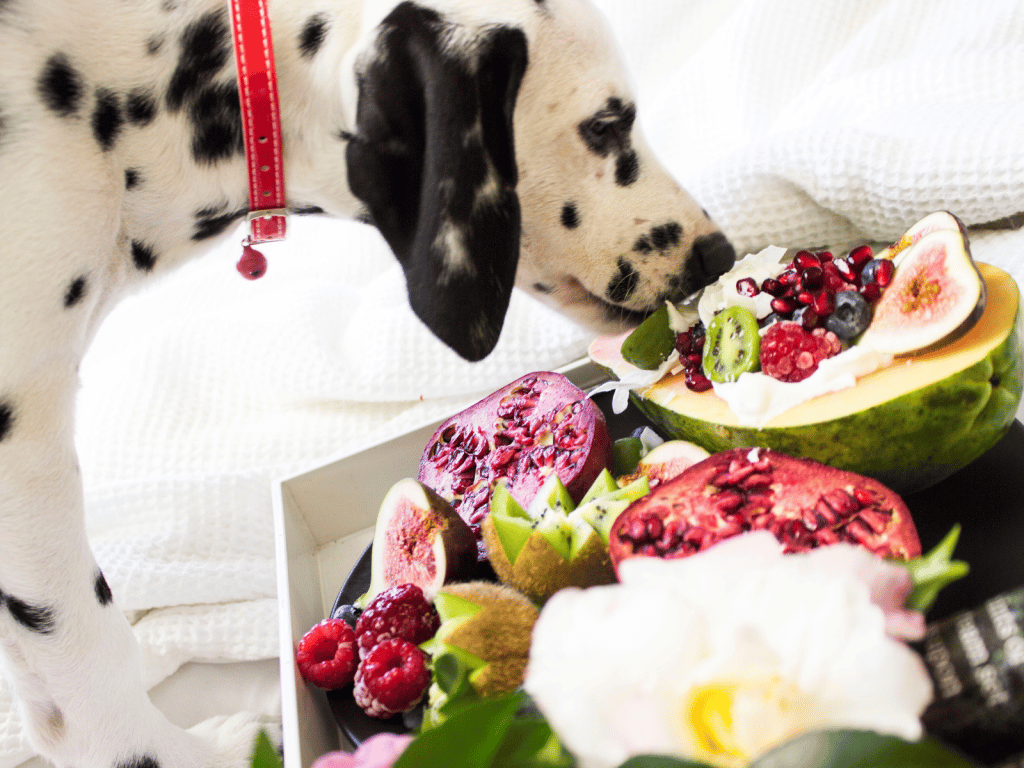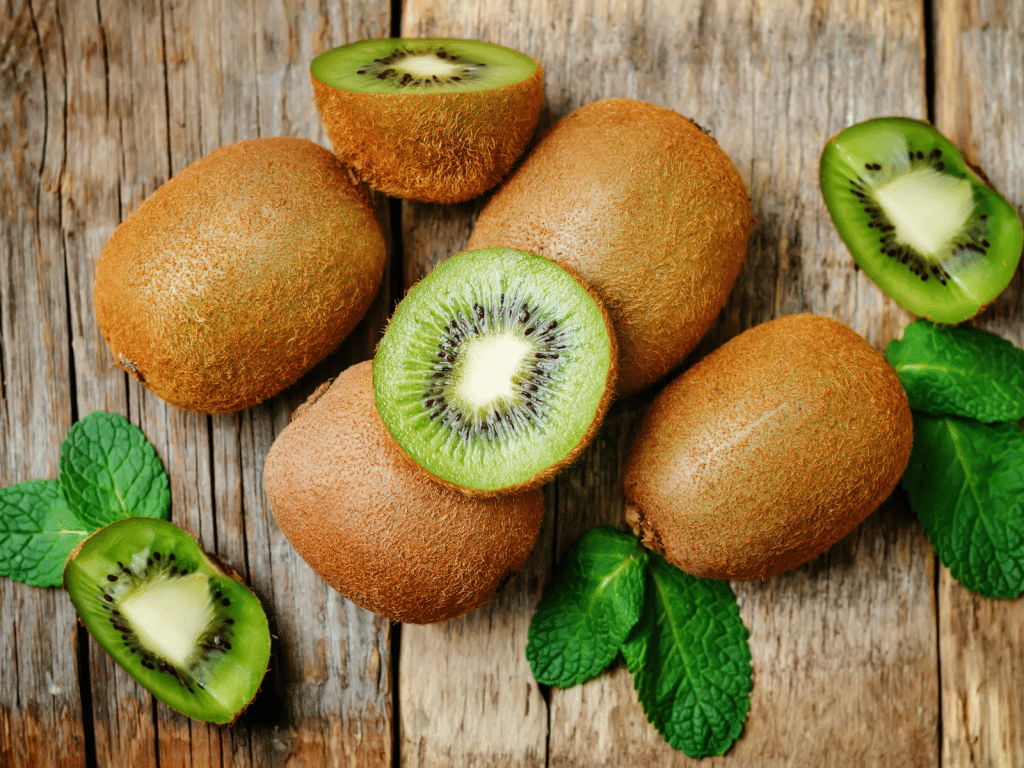Despite their small size, kiwis are very flavorful because of their combination of sugar and acid. Vitamin C, vitamin K, vitamin E, folate, and potassium are just a few of the many human health benefits of this little fruit. But are these same benefits available to canine companions? To learn whether your dog can enjoy a kiwi with you, keep reading!
Have no fear – dogs can safely consume a little kiwi fruit. As long as it is given in little amounts and in moderation, the fruit is perfectly safe for dogs to enjoy. The vitamin and sugar content is rather high, and the water content is very high as well, making this a tasty and somewhat nutritious treat for your dog.
Introducing Your Dog to Kiwi

Introduce kiwi to your dog gradually, as you would any novel meal, to see whether he or she develops an allergy, intolerance, or digestive upset.
Benefits of eating kiwi for people are well-documented, but the potential advantages of giving kiwi to dogs are less well-understood, and should be done so with caution.
You should keep an eye out for any signs of an allergic response in your dog. After feeding your pet a new meal, keep an eye out for any adverse reactions. Swelling, trouble breathing, and stomach problems are typical reactions to allergens. Stop giving your dog bananas, avocados, and watermelons if they exhibit indications of a kiwi allergy.
Keep an eye out for gastrointestinal distress or a lack of bowel movement. Symptoms of a negative gastrointestinal reaction to a treat or meal include a lack of appetite, vomiting, and diarrhea. Most of the time, these symptoms will disappear on their own within a short time, but if they last more than a day or two, it’s best to consult a vet.
As long as it is served in moderation and is not too large of a portion, the fruit is OK for dogs to consume. The vitamin and sugar content is rather high, and the water content is very high as well, making this a tasty and somewhat nutritious treat for your dog.
Health Matters
“Kiwi fruits are not regarded to be poisonous to dogs,” explains the Dogs Trust spokesman, “but kiwi fruit seeds do contain a very tiny quantity of a potentially toxic substance that might be a concern if swallowed in big numbers.”
The kiwi actually contains more vitamin C than an orange, which may come as a surprise. In addition to vitamin K, folate, and potassium, it is also very high in these nutrients. Plant-based enzymes included in this have been shown to assist digestion in humans and canines alike. In addition to being beneficial for their digestive systems, fruits (particularly when eaten with the skin) are a wonderful source of fiber.
Normal metabolic processes, such as the production of red blood cells and DNA, rely on folic acid (also known as vitamin B9). The electrolyte potassium keeps the body’s electrical currents steady, which in turn keeps the nerves transmitting impulses regularly and the heart beating correctly.
Healing wounds and boosting your pet’s immune system are just two of the many benefits of vitamin C’s potent antioxidant status. While vitamin K helps keep blood healthy and clotting properly, it also has other applications. Dogs don’t need large amounts of these vitamins since they can synthesize them internally.

Potential Downside of Giving Your Dog Kiwi
A dog may easily choke on a whole kiwi if it doesn’t chew it up first. Smaller dogs are not likely to try to gulp down a whole kiwi, but bigger dogs do. Every dog, no matter how big or tiny, may benefit from eating kiwi if it is cut into small pieces. To help your dog stay cool and hydrated during the warmer months, you could even prepare a fruity ice lolly using a variety of various non-toxic fruits, including kiwi.
The risk of kiwi poisoning in dogs remains even if the fruit is cut up into tiny pieces or only given to the dog on rare occasions. If your dog has an allergy to kiwis or eats too many of these high-sugar fruits, it might develop a number of health problems. Three possible negative outcomes from giving kiwis to canines are as follows:
- Danger is choking, especially for little dogs with short windpipes who could have trouble swallowing a large piece of kiwi. If you want to give your dog a kiwi, you should cut it up into little pieces beforehand. Dogs with delicate stomachs may benefit from eating the fruit in smaller quantities.
- The intestinal obstruction or constipation that may result from eating kiwi peel is a common complaint among dog owners. An unpleasant condition that might make it difficult for your pet to defecate solid feces. Obstipation (colon impaction) and megacolon are two potentially serious complications that may arise from a persistent obstruction that is not addressed (a dilation of the colon).
- Obesity: Keep your dog away from kiwi as the fruit’s high sugar and calorie content may contribute to the development of obesity and its related health problems. Your dog’s mobility may be impaired and his or her quality of life reduced if he or she is overweight.
Dogs and Kiwi Fruit Questions
How Much Kiwi Can I Feed My Dog?
Your dog will like kiwi fruit as a treat, but it shouldn’t make up more than 10 percent of his or her diet. In most cases, it’s safe to give your dog a few nibbles or slices as a treat or meal topping on occasion, but before you do, check with your doctor. Maintain a healthy balance.
Are kiwi seeds safe for dogs to eat?
Most dog owners probably don’t need to worry about their pups accidentally ingesting a few kiwi seeds from a single slice of fruit. The seeds of kiwis, like those other stone pit fruits, contain a trace amount of amygdalin, which may be converted to cyanide. Despite the low concentration, kiwi seeds should be removed before feeding them to your pet.
I hope you have enjoyed this article on feeding Kiwi fruits to dogs. As with all dietary articles, it is prudent to seek the advice of a Vet before making major changes to your feeding routine.



